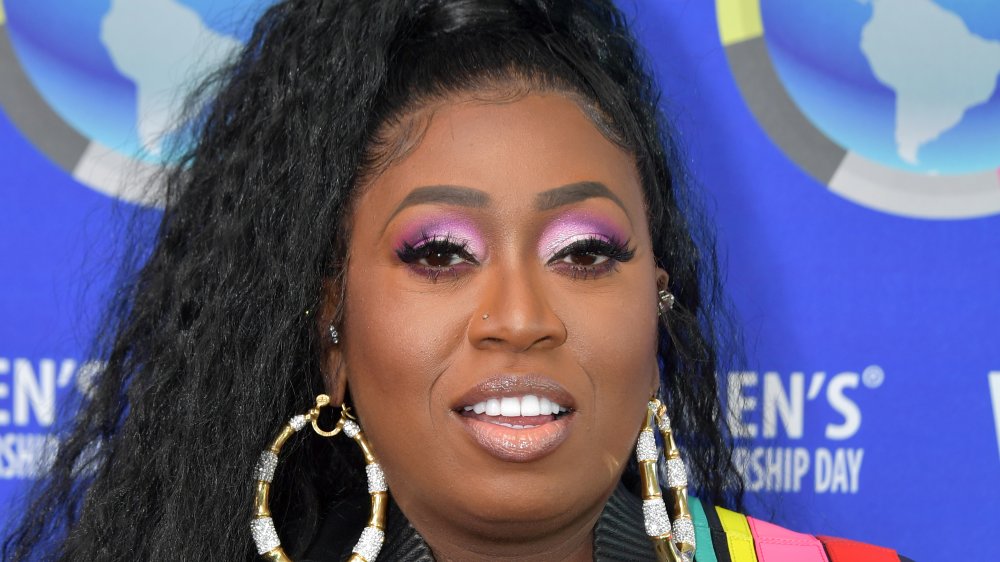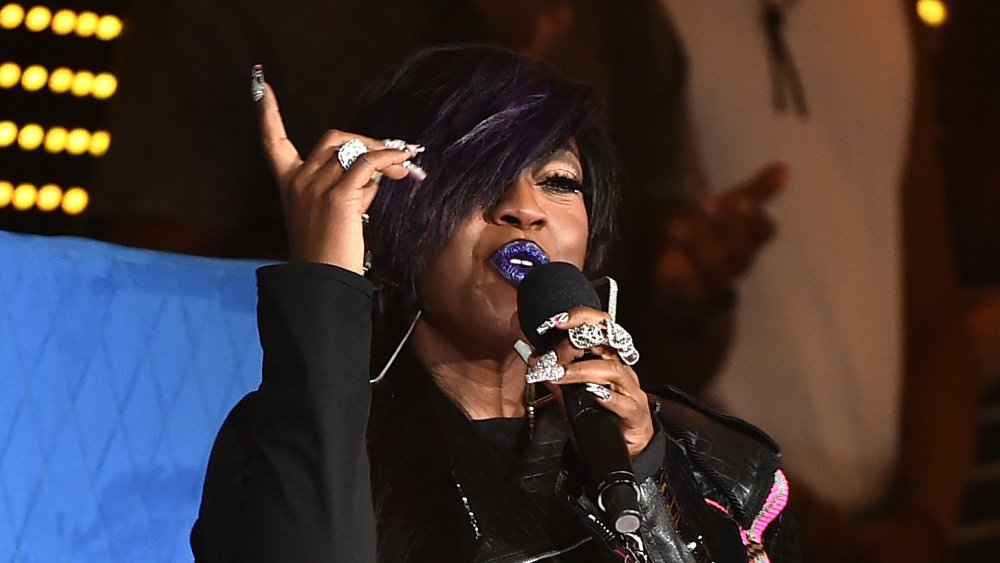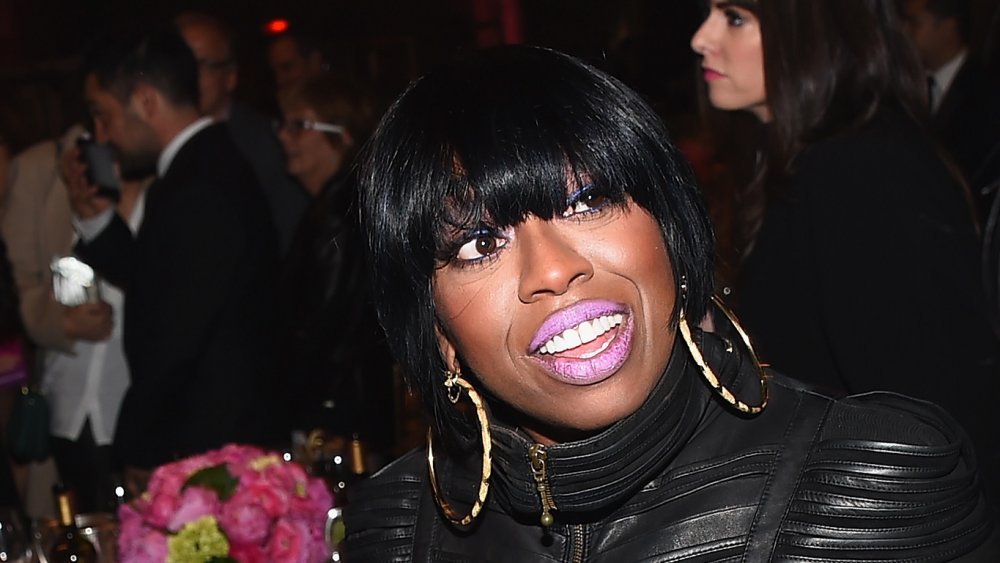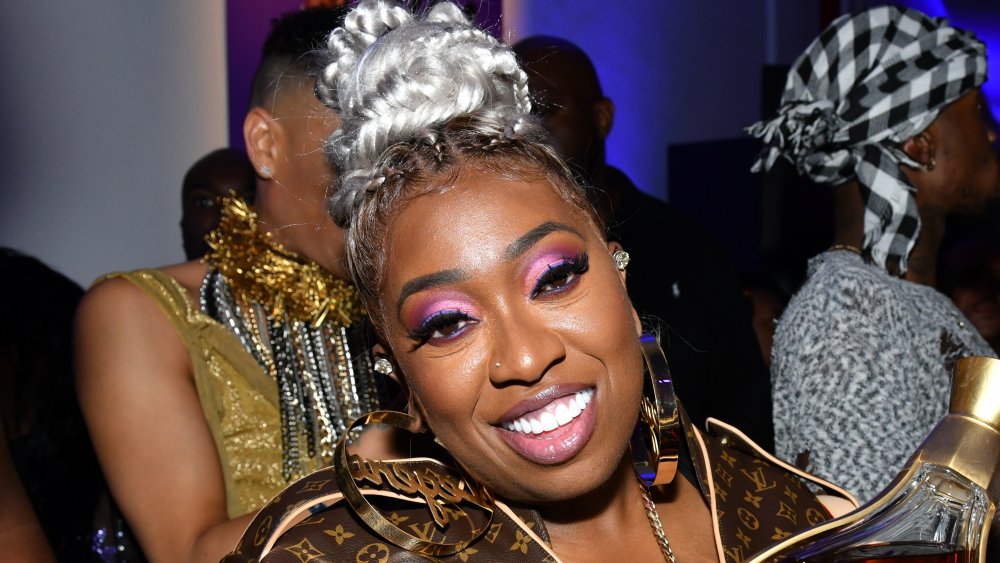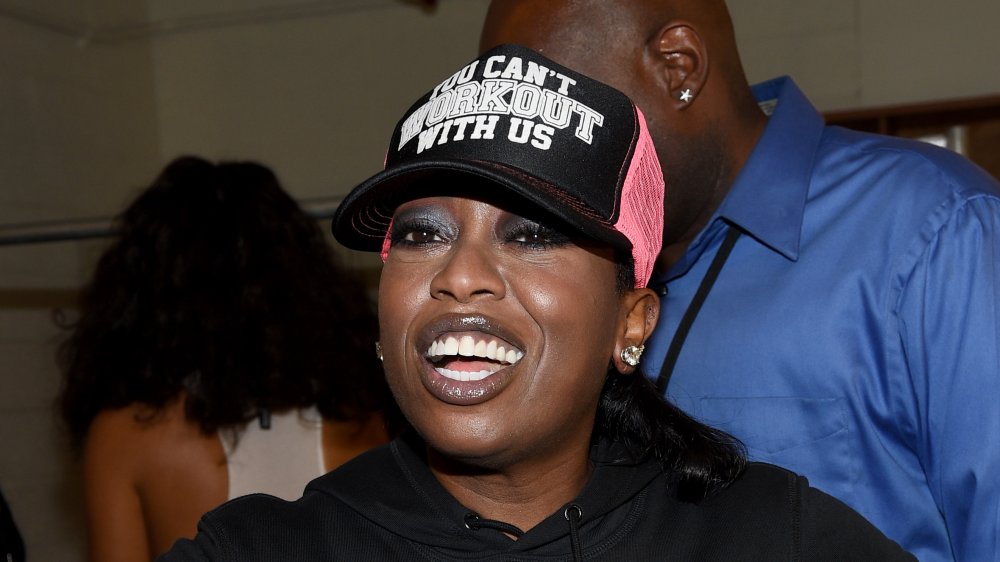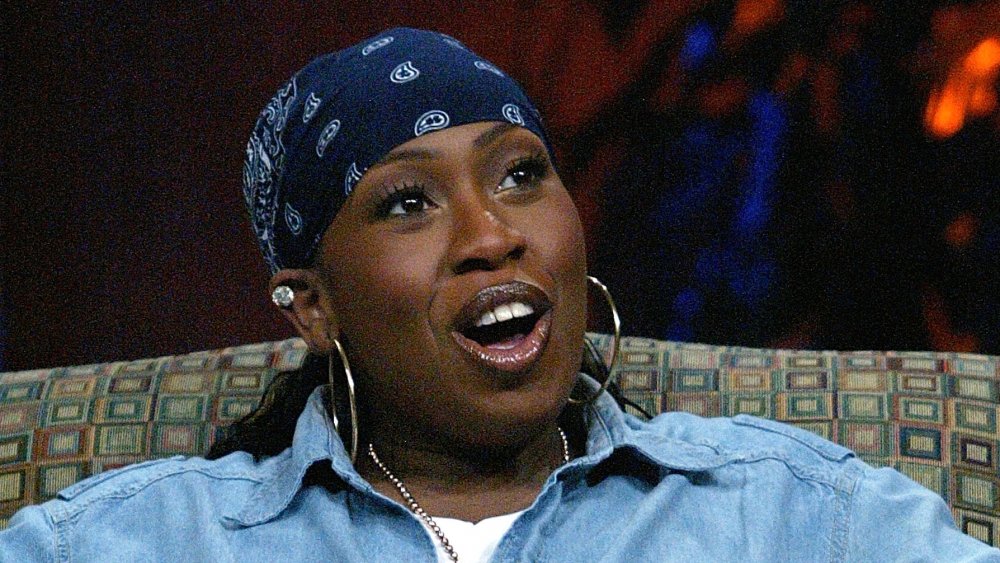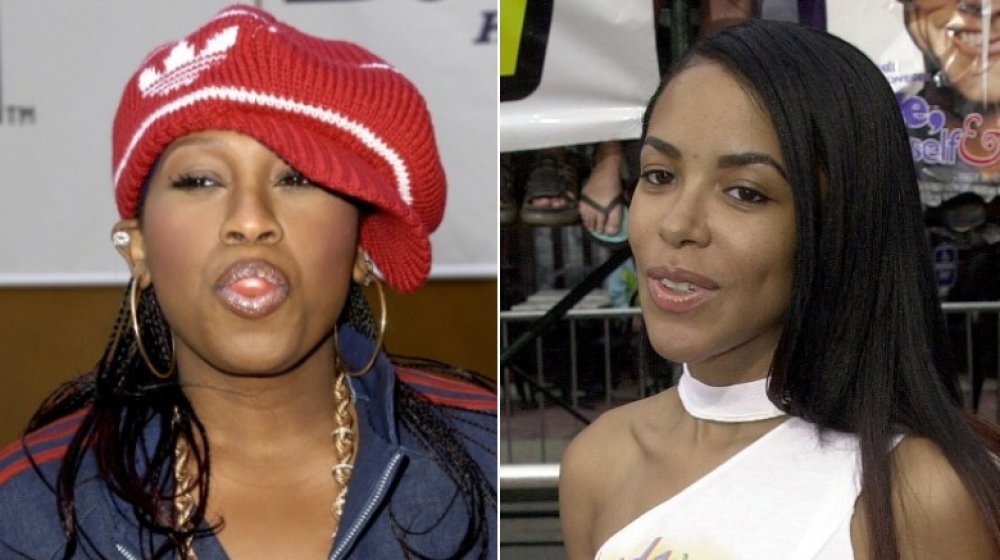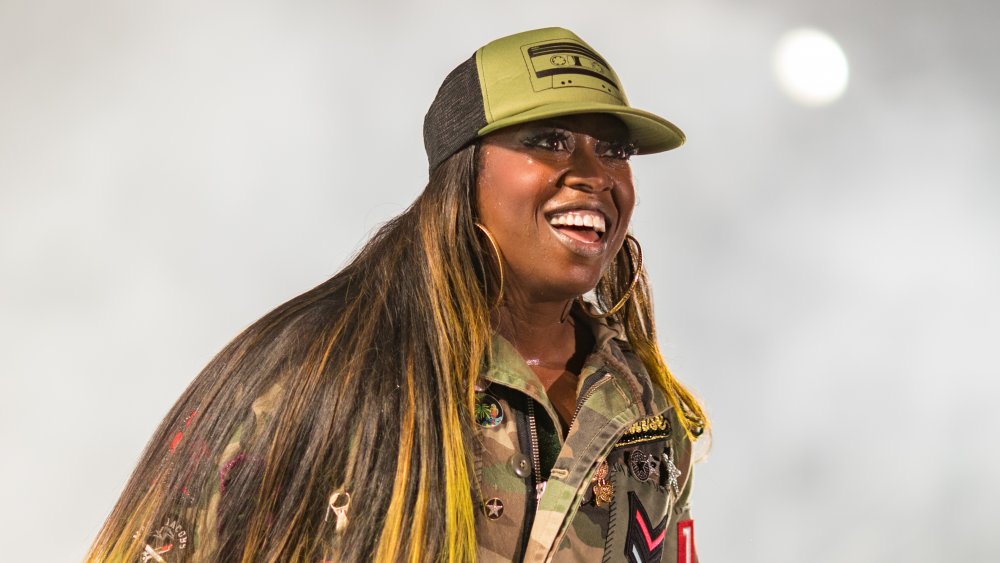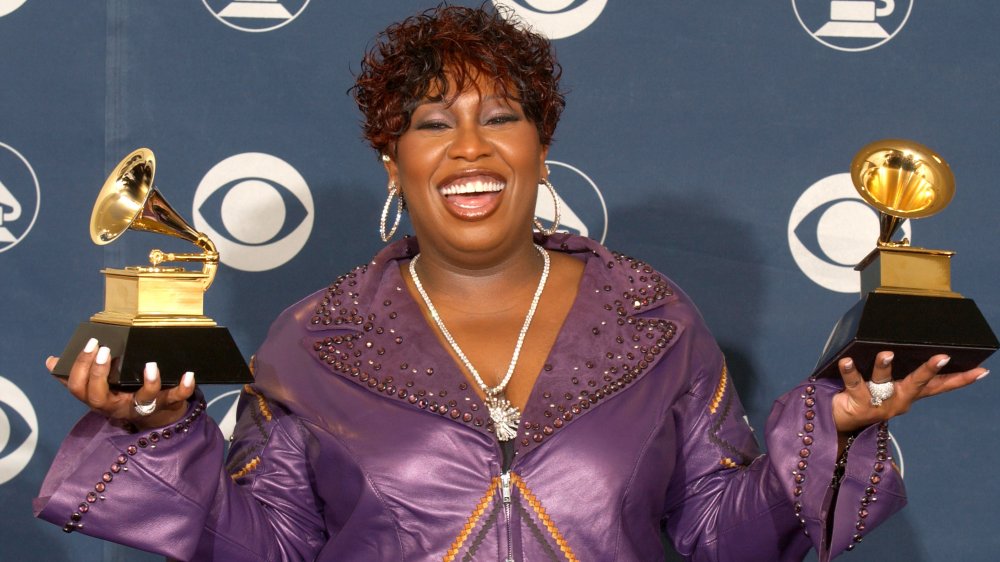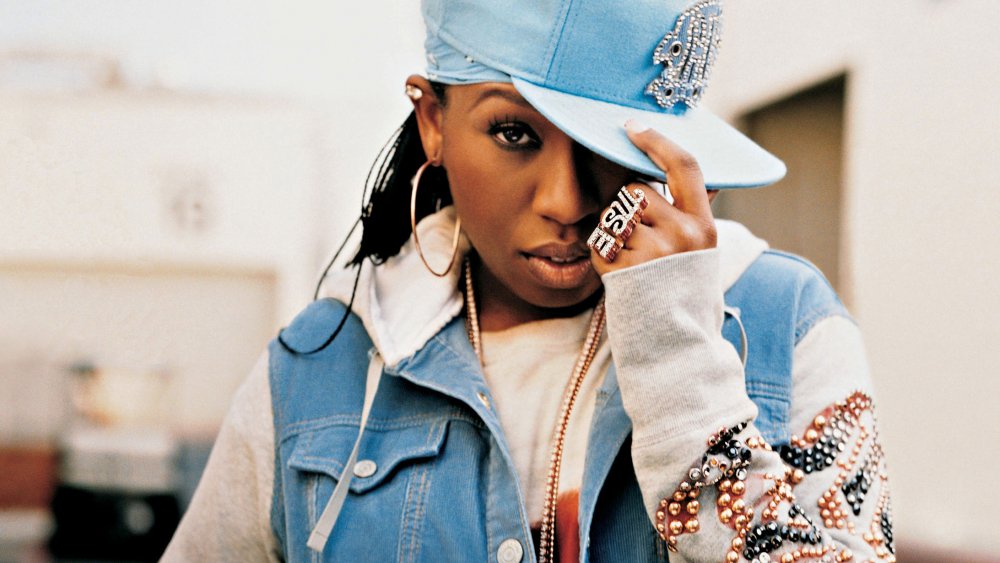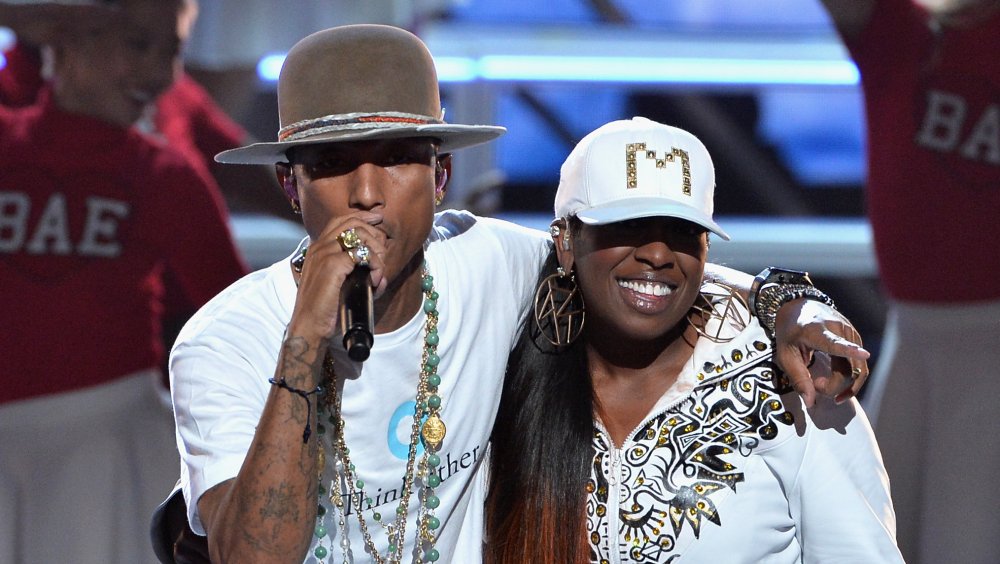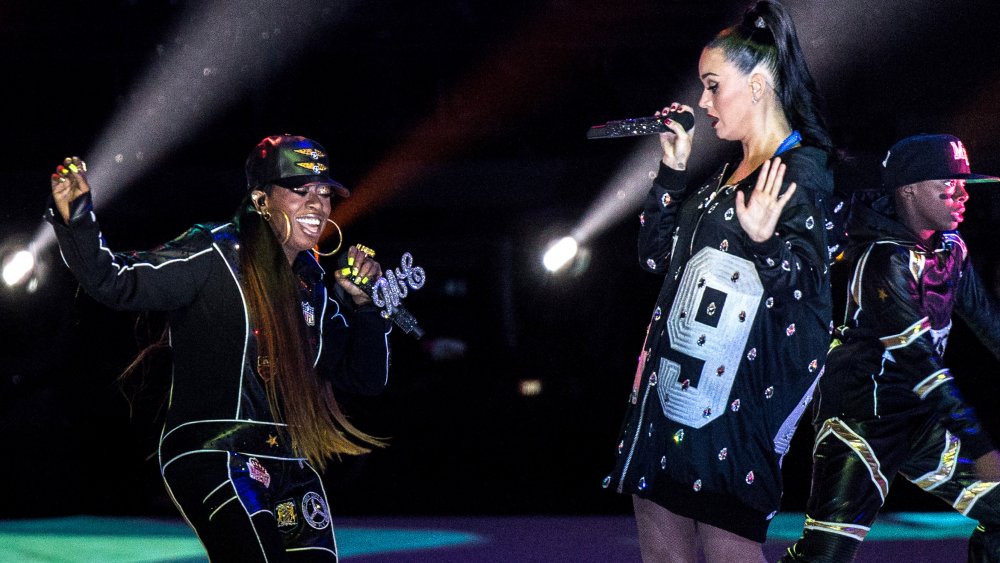The Tragic, Real-Life Story Of Missy Elliott
Believe it or not, Missy Elliott (real name Melissa Arnette Elliott) has been in the music industry for over 20 years. The musical legend has made us get our freak on, lose control, and even throw it back all over again with her addictive jams. Well-respected by her industry peers, the so-called "Misdemeanor" has inspired countless others. "[We'd] be watching Missy Elliott videos back in high school," Kendrick Lamar mused to Billboard in 2018. "They were always big inspirations." Lizzo has also gushed about her idol numerous times, getting particularly candid in an interview with Teen Vogue, revealing, "Missy Elliott is like my ultimate icon, I love her so much."
With four Grammy wins and 22 nominations, it's hard not to agree with these two. In 2019, Elliott received the highest honor of her career: she was inducted into the Songwriters Hall of Fame. Per Billboard, she was the first female rapper to be given the award, and as the crowd erupted in applause, it was clear she deserved it, too.
However, life hasn't always been easy for the rapper. In fact, it started off as shocking. "I'm blessed to be living this dream of writing and singing, but that's not the real dream I had," Elliott told The Guardian in 2001, adding that she initially wanted to make enough money to take care of her mother. Throughout all her hardships, the "Work It" musician has come out on top. Here is the tragic, real-life story of Missy Elliott.
Missy Elliott grew up with an abusive father
Missy Elliott's hardships began when she was still just a young girl, growing up with her abusive father, Ronnie. "I remember having mice in the house and my father taking some newspaper and beating me," the "One Minute Man" rapper told VH1's Behind the Music. "Because mice was running on me while I was asleep." She delved deeper to Beverly Bond for her 2018 book, Black Girls Rock!: Owning Our Magic. Rocking Our Truth (via Exclaim), saying that "her father [was] physically abusive" to both herself and her mother, Patricia. "When she cried, it would hurt me, because she was always everything to me."
Patricia also detailed a particularly terrifying moment to Behind the Music — where Ronnie reportedly pulled a gun on her in front of their daughter. "My husband said, 'This is it, I'm gonna kill you. It's over!' ... I was so tired of being beaten over and over, I just said, 'Fine, just do it.'" A distraught Missy ran and got her uncle to intervene and stop the conflict, but the situation at home would only grow worse. As Missy Elliott told The Guardian in 2001, she was almost certain Ronnie would shoot both of them.
Patricia eventually grabbed her daughter after her 14th birthday, and the pair packed their things and left Missy's father (via The Guardian). While the abuse had stopped, it was only the tip of the iceberg of the future rapper's woes.
She had a fractured social life as a child
Before Missy Elliott and her mom were able to escape their grim living situation away from Patricia's husband, the future rap star would sit at home with her mother, in fear that something terrible would happen if she left the house. "I never wanted to go stay at my friend's houses," Elliott told Essence in 2000 (via Missy Elliott by Tracy Brown Collins). "I always thought my father would beat my mother up or kill her."
The "Work It" rapper's time at school wasn't much better, either. As it turned out, Elliott had an extremely high IQ — ruining her chances of connecting with her peers. As Patricia told Rolling Stone (via Missy Elliott), "When she was in elementary school they took tests. Her IQ was so high ... it was like a genius IQ. Then they skipped her two grades, from the second to the fourth." Unfortunately for Missy, once she jumped grades, her studies suffered, as she "felt out of place with the older children," per Missy Elliott.
The only way for the future musical icon to get by (mentally, at least) was to send letters to her own idols. As Elliott detailed to The Guardian years later, she begged Michael and Janet Jackson to "rescue" her: "I would check my mailbox every day, come rain, sleet or snow. They never wrote back. I cried every night about that. Now, I'm friends with Janet. I write songs for her."
Nobody supported Missy Elliott when she said she was going to be a star
Missy Elliott always knew she wanted to be a hip-hop artist. "I used to write song lyrics all over the walls of my room," she recalled to Entertainment Weekly (via Missy Elliott by Tracy Brown Collins). "My mother was like, 'You ain't going nowhere this weekend if I see another song on that wall."
So, how early did her lyricism obsession start? In an interview with Marie Claire, the "Lose Control" hitmaker revealed that she knew she wanted to be a rapper when she was in kindergarten, adding that she'd repeatedly tell her class she wanted to be a "superstar." The reaction? "The whole class would bust out laughing." Ouch.
Still, Elliott kept pushing towards her goal, even when her family told her to give up. "Trust me, I was broke," she matter-of-factly admitted to Marie Claire. "And my family would be like, 'You better find something to do.' They told me to go in the Army. I'm like, 'I'm too fat to go in the Army. Where I am running to?'" Elliott added, "Everything just seemed so impossible at the time because we didn't have the technology to be able to reach out and put your stuff online and people get a chance to see it. So you have to be at the right place at the right time."
Her living standards were extremely rough
Missy Elliott certainly wasn't born into money like some of her A-list rapper peers. In fact, her living situation was awful. "We didn't have running water," mom Patricia Elliott explained on VH1's Behind the Music, adding, "We were going in a pot that sat by her bed, because we didn't have a bathroom." It sounds utterly shocking, but that was the norm for the "Throw It Back" rapper.
To make matters worse, father Ronnie Elliott wasn't just unpredictable in his personal life; professionally, things were up in the air, too. As Tracy Brown Collins detailed in her biography, Missy Elliott, Ronnie was a United States Marine when his daughter was born, meaning the family had to relocate quite often, even spending time living in a trailer park in Jacksonville, N.C.
Ultimately, Ronnie quit the Marines while Missy was a teenager, deciding to relocate the family back to Virginia, where Missy was born. Per The Guardian, "They lived in Portsmouth in a propane-heated rented shack. It was so cold and unsanitary in there that at night Ronnie would wrap his wife and daughter in his military blankets." Even when Patricia packed her things up, daughter in tow, and left her husband, poverty still followed them. As it turned out, Missy's only salvation came from forming a band, Sista, with three of her close friends and her "neighbor and songwriting partner," Tim Moseley — later to be known as Timbaland.
The music industry wasn't on Missy Elliott's side
Missy Elliott headed to New York with Timbaland in the mid-'90s with high hopes of becoming a star. According to The Guardian, she was quickly shot down, with the music industry telling her she was "too tubby" for a singer. "They'd broken my heart," Elliott recalled to the outlet. "They said I could sing, I could write, but that I looked wrong." Echoing a similar albeit harsh sentiment to the New York Daily News, she explained, "At the time it was all about females who were half-clothed. I would look like a mess if I did that."
Nevertheless, "The Rain" artist instead jumped to another one of her money-making talents: songwriting. As The Guardian revealed, Elliott and Timbaland began selling songs to various artists, finally making names for themselves — until they hit the jackpot: they landed a hit with Aaliyah's "If Your Girl Only Knew."
Eventually, Elliott did lose some weight, but she did so on her own terms. "Missy is always going to be Missy," she mused to the New York Daily News. It looked like the industry had caught on, too, and views on beauty standards versus talent had somewhat changed, as well. "Women in rap ... they come and go," a New York DJ dished to The New Yorker in 1997, when Elliott broke onto the scene. "They don't last, because they work one gimmick — their sex appeal — and that doesn't last long."
Missy Elliott's close relationship with Aaliyah came to a tragic end
Another celebrity with a timeless legacy in music, perhaps even more significant than Missy Elliott's, belongs to the late Aaliyah Dana Haughton — known simply as Aaliyah. Elliott crossed paths with the Aaliyah in the mid-'90s while working with Timbaland, when the pair were approached to produce an album for the to-be R&B legend. According to VH1's Behind the Music, "From the moment they met, a lasting friendship was born," with the "Lose Control" rapper even claiming that the trio was "inseparable."
Thanks to how much all three meshed both musically and personally, Aaliyah's album, One in a Million, came to fruition. With her A-list pals by her side, Elliott was finally considered an "It" girl in hip-hop. By the time her third album, Miss E... So Addictive, came out in 2001, she was at the top of her career. Around the same time, however, her personal life was crumbling. On Aug. 25, 2001, news broke that Aaliyah was killed in a plane crash in the Bahamas. "Missy was devastated," a friend of Elliott's told Behind the Music. "It was literally [like] losing a family member for her."
Years later, Missy still hasn't forgotten about her close friend. In 2017, she took to Twitter to post a video of herself writing a letter for the "Try Again" crooner. "Aaliyah: We miss you so much, but your legacy will live on forever and ever!"
She left the spotlight to battle an autoimmune disease
Missy Elliott's star only seemed to be rising in the early aughts — then she suddenly disappeared after her 2005 album, The Cookbook. So, what happened? In 2011, the "Get Ur Freak On" rapper revealed to the public that she was suffering from Grave's disease, an incurable autoimmune disorder.
Speaking to People, Elliott explained her disappearance. As the outlet wrote, the Virginia-born artist was first diagnosed with the disease in 2008, as it "first began affecting her motor skills, followed by a string of symptoms: dizzy spells, lumps in her throat, mood swings, hair loss, a fast heart rate, and bulging eyes." Ultimately undergoing radiation and medication, it's no wonder Elliott was both physically and mentally drained. As "Misdemeanor" told People (via The Guardian), the way she was diagnosed came after a terrifying brush with fate while she was driving: "I was trying to put my foot on the brake, but my leg was jumping. I couldn't keep the brake down and almost crashed."
As the years went on, Elliott spoke out even more about her battle. At Essence magazine's 9th annual Black Women in Music event in 2018 (via Good Morning America), the This Is Not a Test! hitmaker took the stage and declared, "I was sick and I couldn't even lift a pen. My nervous system had broken all the way down. I didn't come up in here in a wheelchair. Nobody helped me get up here. I'm walking."
Missy Elliott had to fight her way in a male-dominated industry
If facing hardships due to her weight wasn't enough, Missy Elliott also had to fight her way in a male-dominated rap industry. "The hardest thing about being a female rapper is proving yourself," the "Pass that Dutch" artist told Ebony. She elaborated on the concept of gender dynamics in a 2011 interview with the Los Angeles Times (via Exclaim!), saying, "It's funny, because for females in general, not just in music, but the corporate ladder as well, anything we do has always been harder for us. When it comes to music, the industry wants you to conform, to look like this and to sound like this and do this or that."
So, how did Elliott battle the naysayers? By just being Missy, of course. "We came up in a time where we were always told no. Where we were always placed in a box. And she defied it," Pharrell Williams told Elle in 2017. "Over and over again. She defied the physics that were dictated to us. She ignored the gravity of standards and prejudices and stereotypes." Sure enough, as Elliott released music videos so drastically different from her female hip-hop peers, the world watched, and a legacy was gradually born.
To this day, Elliott continues to inspire a new batch of artists. "Missy always looked cool in her videos," Tyler the Creator told GQ of the icon. "Just the swag that she had in her videos. She made a f**king plastic bag look awesome. I always thought that was really, really cool."
She was forgotten simply because she wasn't on camera
Missy Elliott's diagnosis with Grave's disease saw her quietly descend from the spotlight in the latter portion of the mid-aughts, causing the masses to, unfortunately, slowly forget about her. What the public didn't know, however, is that "Misdemeanor" never left.
"I needed a break," Elliott explained to i-D in 2015. "I never stopped recording, but I went through a period where ... the one thing that a lot of people don't know is that for as long as I've been an artist, I've been a writer and a producer." She added, "So I've had to write and produce for other artists and then maintain my sound and myself as an artist. So all that time, I was doing Missy and also making sure I was giving all of these other artists a different sound too. That was hard for me."
A 2017 Elle profile of the music-making legend detailed how Elliott "has written more than 500 songs, produced music for Ciara, Janet Jackson, Mariah Carey, and Whitney Houston, and taken just three vacations in her entire lifetime." The numbers are staggering, and her lasting legacy was finally honored in 2019 when the "Throw It Back" artist took home the Video Vanguard Award at the 2019 MTV VMAs. As MTV Intl. co-brand head Bruce Gillmer told Variety of the award, "Missy's impact on the music landscape is indelible. Her creative vision across production, performance and songwriting is unmatched."
Missy Elliott felt left behind in the industry
After retreating from the spotlight she so rightfully dominated in the early 2000s, Missy Elliott suddenly made a triumphant return in 2015 — taking the stage with Katy Perry during the Super Bowl Halftime Show. As Elliott recalled to i-D, "My manager called me and said 'Would you like to do the Super Bowl'? I was sat there looking at the phone like 'Did she just say the Super Bowl?' I felt like, who turns down the Super Bowl but then, why would I be doing the Super Bowl at this point?"
Of course, the comeback felt daunting, especially considering the Virginia native hadn't released any new music since 2005's The Cookbook. "I've performed for some of the biggest crowds but the Super Bowl has to be the scariest moment." Elliott dished to i-D. "It was a time where I felt like 'Do I still have it?' Especially when you see a whole new slew, a whole new generation of kids."
It turned out, she did still "have it," even with a younger generation who had no idea who she was. After the performance, it was Elliott's childhood friend from Virginia, Pharrell Williams, who convinced her to release new music finally. As she detailed to i-D, "He said 'I'm not trying to push you, but people miss you. Do you see what happened out there?' ... He was like 'I want to get in the studio with you.' Who turns down Pharrell?"
To this day, Missy Elliott still gets performance anxiety
Even though Missy Elliott's been performing for over two decades, this celeb miraculously still suffers from anxiety. As the rapper explained to The Guardian of her 2015 Super Bowl performance, she was "freaked out" to perform. "I ended up in the hospital for having an anxiety attack," Elliott said. "I think any artist who has had a break such as that one would be anxious."
Thankfully, it was actually Katy Perry, with whom she performed, who pushed the hitmaker in the right direction: "I remember Katy saying: 'This is the perfect time to perform your new record. It's the biggest platform.' I was like: 'I don't even know if they remember the old ones so I most definitely don't want to do a new one!'"
For a younger generation, her old hits were indeed new. As Elle detailed in its 2017 profile of Elliott, "Twenty-four hours [after the Super Bowl], 'Get Ur Freak On,' 'Work It,' and 'Lose Control' would be downloaded about 20,000 times each, taking turns hitting the number one spot for downloads on iTunes." Just like that, "Misdemeanor" was back. As she told MTV News in 2019, "I went through things in my life to get here and I'm just trying to help people see like, 'Keep going ... [There's] going to be some turns, some stops, rocky roads, but you know, just keep going' ... If I had a stop, then I wouldn't be sitting here."

